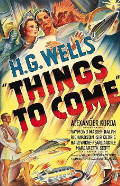
Directed by
William Cameron Menzies
113 minutes
Rated PG
Reviewed by
Bernard Hemingway


H. G. Wells' Things To Come
This remarkable sci-fi film is unlike anything I have seen in British cinema. It starts with a striking scene-setting sequence that is reminiscent of the editing techniques of Soviet silent film, cutting rapidly from long shot to close up and make extensive use of textual elements, all to the rhythms of Arthur Bliss’s music in order to create a sense of impending chaos. It then settles down to a more straightforward, but nevertheless highly ambitious, depiction of the 100 years, 1936 - 2036, Alexander Korda’s set design and the vision of the future owing more than a little to Fritz Lang’s masterpiece, Metropolis (1926).Adapted by H.G. Wells from his own novel, the film in many ways posits a classic modernist thesis of the necessity of science-based progress, with man’s travelling to the stars as its ultimate triumph (“the Universe or nothing”, as Cabell puts it). Between the two nominated time-points the film undertakes a hyperbolic (and perhaps overlong) journey through war, pestilence and finally technocratic peace as it explores the cycle of creation and destruction that it posits as Western man’s history. The cast is outstanding with Raymond Massey in the lead as the visionary Cabell, Ralph Richardson as a tyrannical overlord to his benighted people, the striking Margaretta Scott as his woman, Roxana, and Cedric Hardwicke as a Luddite determined to keep mankind rooted in the old ways.
FYI: There are various versions of the film with a run time anywhere between the original 113 mins and the 92 mins of its US release. Australian-born veteran cinematographer, Robert Krasker is credited here as a camera operator,
Want something different?





